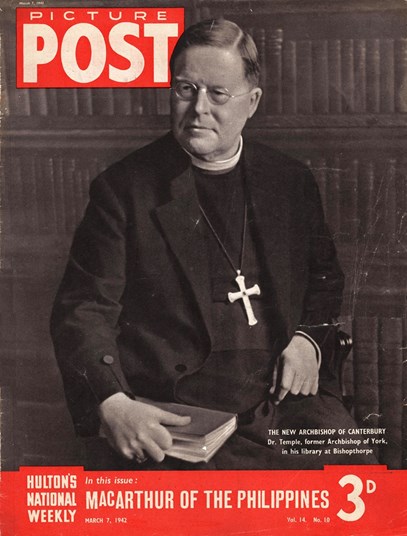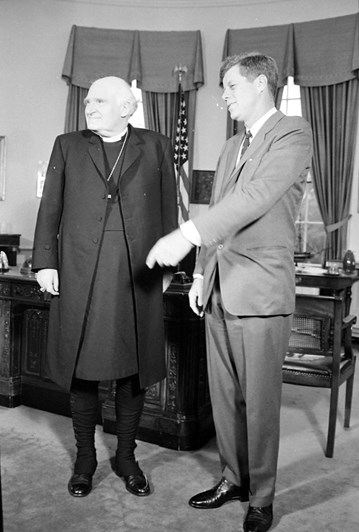THE authority of an Archbishop of Canterbury (ABC) is primarily moral and pastoral rather than magisterial or executive. Their moral authority works by persuasion and argument, of which the articulation of the faith in preaching and teaching is a vital part.
What the Archbishop of Canterbury is not
An ABC does not enjoy any special or unique mandate to teach the faith. There is no “magisterium” that attaches to the office of archbishop in the way that it does to the Pope; there is no comparison. An ABC is not a pale reflection of the Bishop of Rome, though both are pastors within their spheres.
Unlike that of the Pope, the ABC’s executive authority is also strictly curtailed, and is no greater than that of any other diocesan bishop (except in the matter of formal Visitations in special circumstances). An ABC is not any kind of CEO of the Church of England. For example, an ABC has no executive authority to order all churches to be shut, as during a pandemic, and their clergy not to enter them.
Neither is the ABC a “leader” of the Church of England or of the Anglican Communion, although the language of leadership has been much vaunted in recent years, largely without content. The teaching of the faith does not lend itself to any “leading” position. It is the biblical, credal, and historic faith, applied relevantly to our times, that, in fact, leads us; and we serve it. Similarly with the proclamation (kerygma) of the gospel: it is the message, the Word, that is in the driving seat, and we are merely the instruments or channels in its service.
Any bishop’s duty and task
The ABC is a diocesan bishop. All bishops, whether diocesan or suffragan, have a canonical duty, expressed in the Canons and their ordination and consecration vows, to teach the faith and to correct error. All bishops, all clergy, and all the lay faithful have a baptismal mandate to witness to Christ and spread the gospel, to proclaim it afresh in their generation.
It should never be said of any bishop, priest, or deacon that their proclamation of the gospel was muted, that people did not know what they stood for. How the gospel is to be proclaimed in a diverse society with a dominantly secularised culture is an art form in itself, though the permanent essence of it is to lift up Jesus Christ, incarnate, crucified, and risen, as Saviour and Lord.
Modern Archbishops of Canterbury who have been noted for their theological teaching, especially William Temple, Michael Ramsey, and Rowan Williams, had been doing it all their adult lives, and carried on that ministry as best they could in office.
 AlamyWilliam Temple, Archbishop of Canterbury, appears on the cover of Picture Post in 1942
AlamyWilliam Temple, Archbishop of Canterbury, appears on the cover of Picture Post in 1942
Temple (a top-drawer ecclesiastic, yet known as “the people’s archbishop”) had, and Williams has, a vital ministry as an apologist for the Christian faith (C. S. Lewis being the outstanding lay Anglican apologist) — building bridges where possible with contemporary cultural assumptions, and communicating and commending the faith to those who have not yet embraced it. It seems that an ABC could not suddenly become a significant teacher of the faith unless they were already well-versed in it. So any ABC — indeed, any bishop — needs to be theologically engaged and abreast of modern biblical study, as well as intellectually alert and culturally well-stocked.
Other ABCs, who were not theologians, however, have been able to produce theologically cogent speeches and statements by using suitably qualified script-writers or drafters. For example, Robert Runcie (ABC 1980-91) would typically commission a draft and then make it inimitably his own — “Runcifying” the text, as was said at the time. An ABC must be willing to ask for advice and assistance in confidence. As Archbishop of York, John Habgood (ABY 1983-95) ably met the need of his time; so partnership and complementarity between the two primatial sees can usefully come into play.
Looking further back, Randall Davidson’s (ABC 1903-28) main theological task was to hold the ring between opposed episcopal theological heavyweights such as Charles Gore and Hensley Henson. Davidson astutely kept a tight grip on the theological agenda of bishops’ meetings, and particularly the Lambeth Conference.
After Davidson, Cosmo Gordon Lang (ABC 1928-42) — not an academic, but a priest, pastor, and organiser — was able to speak and write out of his own devout sacramental spirituality, and this met with respect and gratitude among many (though his ministry was marred by some bad judgements). There are many modes and methods of communicating and commending the faith.
So, if an ABC has no unique mandate to teach or any special authority in doing so, beyond that of any other bishop, what is the nature of an ABC’s position with regard to the teaching of the faith and the proclamation of the gospel? Some selective keys to an answer are public profile, opportunity, and communication.
Public profile
Canon C 18.1 states that “Every bishop is the chief pastor of all that are within [their] diocese, as well laity as clergy, and their father in God” (we understand “mother” where applicable). But bishops are hardly known among the people; so how can they pastor them?
 AlamyArchbishop Ramsey meets President John F. Kennedy in the White House on 31 October 1962
AlamyArchbishop Ramsey meets President John F. Kennedy in the White House on 31 October 1962
My sense is that many churchgoing Anglicans could not name their bishop, either diocesan or suffragan, and, even if they could, have little clue about what their bishop is for, apart from the occasional confirmation service. They seem unaware that, without the bishop, there would be no parish church, no clergy, and no liturgy. They refer to “the diocese” as a remote and faceless entity, external to them, that makes financial and administrative demands on parishes. They don’t realise that they are embedded within the diocese as an organic entity, a living part of it as the sphere of the bishop’s ministry of the Word, the sacraments, and pastoral oversight.
Lacking a clear public profile or recognisable identity, any bishop will find that their teaching of the faith and proclamation of the gospel falls flat; and how much more does this apply to the ABC.
All bishops — and pre-eminently archbishops — need to project their ministry, office, and role; that is to say, what they stand for on behalf of the Church of Christ, always representatively. It is not appropriate or seemly for them to try to project their own personality, because that is impossible (though their face needs to be known). They will always be misimagined — figments of fantasy, hardly real people — by those who do not know them well. It is the episcopal ministry, office, and role (which was in place before, and will continue after, before any individual who holds it) that requires public visibility and recognisability — and that is a huge challenge.
Opportunity
But this is where the ABC has an inestimable advantage, as the only bishop whose considered actions and considered pronouncements stand any chance of receiving national notice in select media. Even then, what the archbishop does may be distorted, and what they say will usually be filleted of gospel proclamation in reporting, leaving only the predictable deploring of social ills and international conflicts.
But golden opportunities have sometimes been thrown away, as at a state funeral, a royal marriage, or even a coronation. These are priceless opportunities to speak to billions of people worldwide of the love of God in Jesus Christ, of the journey of mingled faith and doubt which many experience, and of the welcome that the Church, at its best, provides to all.
In a presidential address to the General Synod, or in contributing to its debates, an ABC should articulate (normally on advice) the first principles — biblical, theological, and sociological — that apply to the issues at stake. Similarly, in the House of Lords, an ABC — even more than other bishops — should rise above the fray and restate Christian principles as a guide to decision-making, as an expression of the teaching ministry of the archiepiscopal office.
Communication
Provided the public profile and the opportunities for witness are put in place, the ABC has a unique advantage in communicating Christian teaching, representing pre-eminently the Church of England and, in fact, Christianity in England.
So, let the ABC present the way of Christ in a winsome manner, exhibiting empathy with doubt and moral imperfection in their hearers, and acknowledging that the status of the Church of England has sunk to an all-time low as far as modern times are concerned, through its own serious failings, and that there are swaths of the population which feel alienated from the Church, let down and rejected, for reasons that we can all name.
Using words is not the only, or even the primary, way in which an ABC can communicate Christian teaching. Actions speak louder than words. So, an archbishop needs to be seen standing with the poor, the sick, the alienated, the excluded, the unchurched, and the de-churched — that stance is also teaching and proclaiming — and standing for the unity and mission of Christ’s Church by demonstrating solidarity and collaboration with ecumenical partners.
Above all, an ABC needs to be clearly seen doing the work that every priest and bishop is called to give themselves to, as their primary task: the public ministry of the Word, the sacraments, and pastoral care and oversight (Matthew 28.16-20).
The Revd Dr Paul Avis is Honorary Professor in the School of Divinity, University of Edinburgh, and Editor-in-Chief of Ecclesiology.















